Worms (helminths) are parasitic worms that invade the human body, causing harm to health, and the diseases they cause are helminthiasis. More than 300 species of this parasite have now been identified. Helminth infections are common but mainly in warm and humid climates. The risk group for them includes children aged 5-15 years. They often contain roundworms and pinworms. This is explained by the child's desire to get acquainted with the outside world, low immunity to helminths as well as insufficient acidity of gastric juice. The main habitat of helminths is the intestine.
They enter the human body through integrated tissues when ingesting eggs and worm larvae with water and food. From ripe eggs, larvae form in the digestive tract. They enter the bloodstream through the intestinal lining and are carried to the liver, gallbladder, bronchi, lungs, heart and brain. During the process of coughing up phlegm and swallowing saliva, the worms enter the human intestine. There, after 70-75 days, they will be able to reproduce.
From damage caused by eggs or larvae to the appearance of adult worms lasts up to 3 months - the first stage of the disease. From the moment the adult forms, the late phase begins. Worms in the human body live in the intestines for up to a year and lay eggs there, which are released into the environment through defecation.
Types of worms
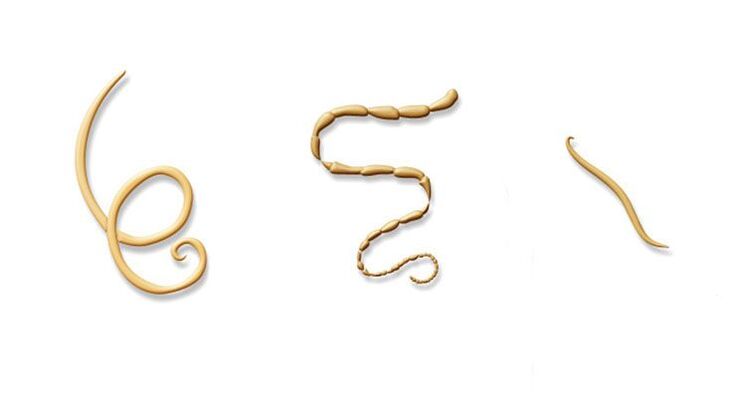
There are several types of worms:
- Roundworms (nematodes) - roundworms, hookworms, pinworms, whipworms.
- Tapeworms (cestodes) - pork tapeworms, broad tapeworms.
- Trematodes (trematodes) - lung and liver flukes, cat flukes.
In addition, helminthiasis differs in its development and infection characteristics:
Geohelminthiase. Parasitic eggs are found underground and enter the human body through unwashed fruit and poor personal hygiene.
Biological helminths. These worms have intermediate hosts in dogs, fish and shellfish. The defeat of humans, the final host of the parasite, is associated with the consumption of low-quality fish or contact with animals.
Causes of worms in humans
Typically, worm eggs are brought into the home on the feet and fur of pets when walking or letting them out. The most common cause of helminthiasis is violation of personal hygiene rules. For example, a person forgets to wash his hands after leaving the house, going to the toilet, or before eating.
The risk of getting helminths increases if you have the habit of sucking your fingers, biting your nails or holding a pen or pencil in your mouth.
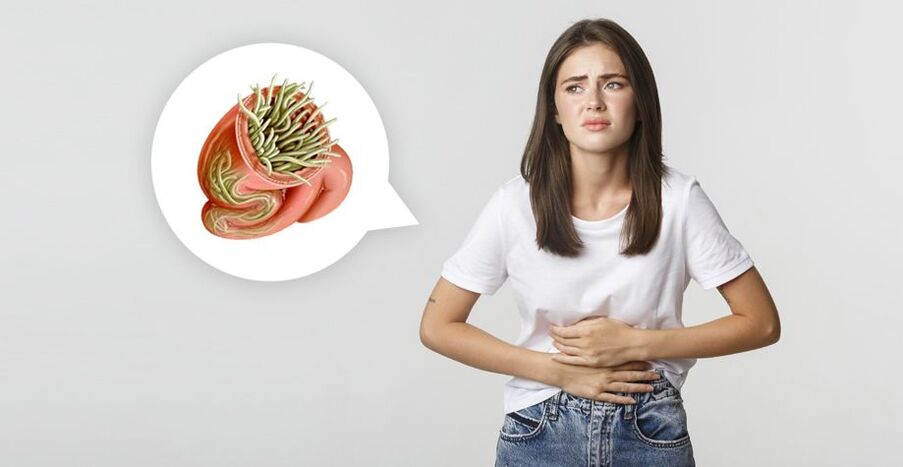
Washing poor quality vegetable products causes great harm to health.
Helminth disease can occur when drinking raw water, as well as washing food with water from an unverified source.
The cause of helminthiasis can be fish or meat if the technology for processing them is violated. If beef is not cooked thoroughly, it can be infected with beef tapeworm; If fish is poorly processed, it can be infected with tapeworms; Undercooked pork has a very high risk of being infected with pork tapeworm.
Worms can also be found in the house if it is rarely cleaned with wet water and people walk on it without taking off their outdoor shoes.
Helminths can be transmitted from sick people through bedding, dishes or close contact.
The cause of the disease is associated with violation of hygiene rules, poor care of domestic dogs and cats, and poor food hygiene. If you eliminate these factors, the chance of being infected with helminths is very small.
Signs of worms in humans
Helminthiase is acute and chronic. The first leads to an allergic reaction. Complaints of patients with signs of allergies and intoxication:
- weakness and fatigue;
- itchy skin and rash;
- shortness of breath;
- cough without phlegm;
- enlarged lymph nodes;
- increased gas formation in the intestines.

In the case of chronic helminth infections, the manifestations are diverse and related to the location of the worms, their number as well as the characteristics of the immune response of the human body. The most common symptoms of worms are:
- weakness, increased fatigue;
- increased body temperature;
- darkening of the skin under the eyes;
- hives;
- appetite disorders;
- nausea and vomiting;
- odor from the mouth;
- stomach-ache;
- diarrhea or constipation;
- losing weight;
- itching around the anus;
- Presence of worm fragments in stool.
In addition, there may be disturbances in the functioning of organs affected by helminths. For example, when the parasite is in the liver or gallbladder, right upper quadrant pain, nausea, and jaundice are typical. If helminths have entered the lungs, bronchitis and suffocation may occur. Roundworms can cause myocarditis and heart failure. Children who are repeatedly diagnosed with worm infections often suffer from ARVI, stomatitis, gingivitis, and girls have vulvovaginitis.
A characteristic symptom is bruxism (teeth grinding at night). With helminthiasis, the nervous system is affected - a person feels more irritable, has difficulty concentrating, reduces the ability to tolerate physical activity, and has sleep disorders.
Against the background of worms in the body, immune defenses are affected, as a result, skin diseases such as fungus, pustules, caries are aggravated, allergies and concomitant diseases are aggravated. than.
If helminthiasis is not treated promptly, the parasitic larvae will damage blood vessels, intestines and all vital organs. This affects the patient's condition and health.
The products that the larvae secrete throughout their lives are toxic to the human body. They cause local allergies, hives, bronchial asthma and atopic dermatitis.
Worms eat proteins, minerals and vitamins of the human body. In children, this can cause developmental delays. Hookworms and whipworms feed on the blood of the host, i. e. humans, and cause anemia.
In the event of mass reproduction of worms in the human body, disruption of the intestinal microflora and incomplete closure of the intestinal lumen and bile ducts are possible. This can be the cause of appendicitis, cholecystitis and intestinal obstruction.
When should you see a doctor?
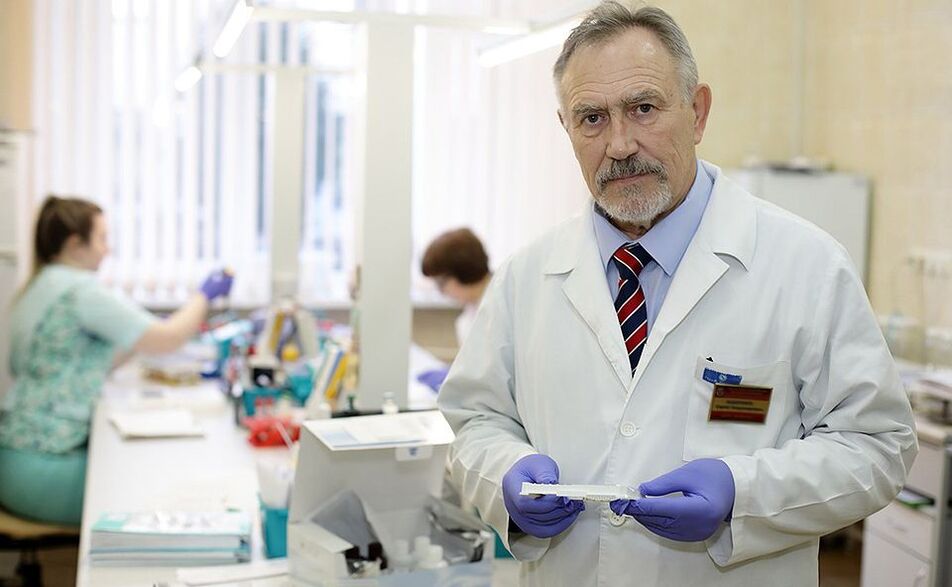
Helminthiasis must be treated immediately. In the human body, worms interfere with the absorption of nutrients in the intestines. They secrete foods that are harmful to the digestive tract. If left untreated, the worms can invade the brain, lungs, and other organs.
You should make an appointment with a qualified gastroenterologist if you have the following medical symptoms:
- lethargy, irritability;
- allergic reactions, for example, skin rash, bronchial asthma;
- a person eats more or less;
- Nausea and vomiting appear but there are no signs of poisoning;
- diarrhea, constipation;
- weight loss with loss of appetite;
- poor sleep;
- increased body temperature;
- muscle and joint pain when not physically active;
- enlarged, inflamed lymph nodes;
- bruxism;
- worms in stool;
- itching in the perianal area.
If helminth infection is suspected, the liver, spleen and lymph nodes will be palpable. The agencies listed may be expanded.
In case of helminth infection, general blood tests show leukocytosis, eosinophilia and increased ESR.
Helminth disease is most accurately detected 3 months after the onset of the disease, when the helminth becomes a sexually mature individual. For the purpose of diagnosis and monitoring the effectiveness of treatment, laboratory tests are prescribed:
- scraping around the anus to look for pinworm eggs;
- Worm egg analysis;
- co-program.
Sputum, urine, vomit, duodenal contents and skin fragments are used as raw materials for examination and diagnosis.
To determine intestinal helminths, allergy tests are performed. Changes in internal organs are detected using:
- Lung X-ray.
- Liver ultrasound examination.
- Computed tomography of internal organs.
- Colonoscopy.
- Esophagogastroduodenoscopy.
Sometimes it is not easy to identify helminths in humans because the worms lay eggs irregularly. To detect them, it is important to obtain research material during the helminth breeding season. Antihelminthic antibodies are detected in the blood 2 months after worm infection. They are then not detected in the blood but accumulate in the intestinal wall. Diagnosis is also difficult due to the variety of clinical signs. Often, experts prescribe research and treatment based on indirect symptoms of helminthiasis.
Folk remedies against parasites
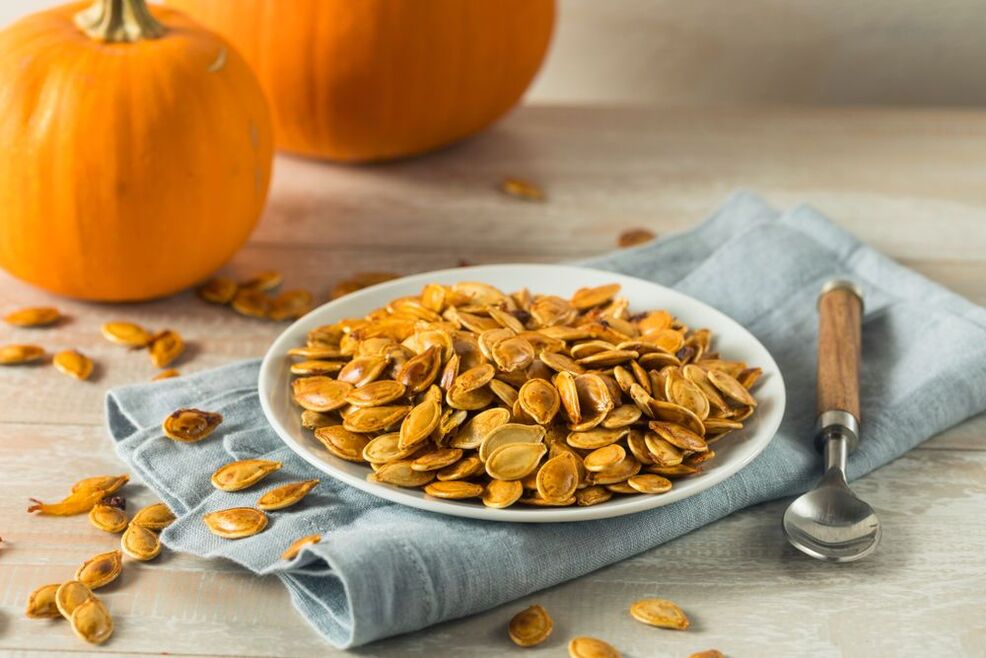
A well-known folk remedy for treating worms is pumpkin seeds. This product is suitable for children and adults. This product contains cucurbitin, which negatively affects the vital activity of helminths. However, it will not be possible to completely cure parasites with pumpkin seeds alone. If you don't see a doctor or get tested, you could develop complications because the worms multiply quickly. They are especially dangerous when they affect internal organs and the brain.
How to kill worms - traditional medicine can be used in addition to the treatment prescribed by the doctor.
Tansy infusion.Pour 1 tablespoon of chamomile flowers into 200 ml of boiling water, cover, leave for 20 minutes, filter the water. Drink cold infusion 3-4 times a day, 4 tablespoons. The first dose is in the morning on an empty stomach, then 30 minutes before lunch and dinner.
Infusion of wormwood.The bitter taste of this plant stimulates receptors in the oral cavity, promoting the formation of gastric juice, bile and pancreatic enzymes. This plant contains chamazulene, which has laxative and anti-inflammatory effects. It negatively affects the life cycle of helminths and has an anthelmintic effect.
To prepare the infusion, dry wormwood is ground in a coffee grinder. After that, 2 teaspoons of plant raw materials are poured into 300 ml of boiling water and left in a thermos for 6-8 hours. Then the infusion needs to be filtered. Take 100 ml in the morning before meals for 2-3 weeks. The product can be stored in the refrigerator for no more than 2 days.
Infusion of cloves. This spice is widely used in folk medicine. The dried buds of this plant enhance the function of the digestive tract, normalize digestion and increase immunity. Clove infusion is effective against worms.
To prepare, pour 500 ml of water into 30 g of buds and wait for the product to cool completely. Drink 1 glass before breakfast.
Clove tincture. Pour 30 g of buds into 500 ml of vodka (alcohol). Soak the liquid in the dark for 2-3 weeks, then filter. Take 1 teaspoon of tincture before meals for 2-4 weeks.
Prevent
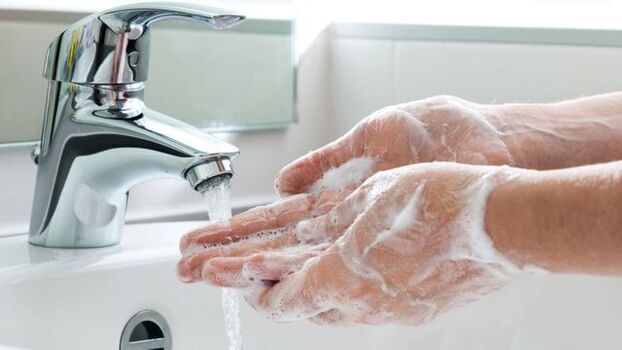
To prevent worms in adults, it is important to follow the rules of personal hygiene. It is also necessary to instill them in children from the first years of life. These rules include:
- Wash your hands with soap after going out, coming into contact with animals, going to the toilet and before eating.
- Rinse fruits and herbs with water and rinse with boiling water.
- Fish and seafood require long-term heat treatment.
- Use high quality and safe water for domestic purposes.
- You need to use your own hygiene products, dishes, towels, and bed sheets.
- To drink, you can use boiled, filtered water.
- In your home, you should regularly wipe down surfaces with a damp cloth and mop floors.
- Every 2 weeks you need to wash the floor with detergent.
How to kill worms - in spring and autumn, it is recommended to prevent helminths with broad-spectrum dewormers. Pets should also be treated with dewormers periodically.
Are worms transmitted - if the rules of personal hygiene and prevention of helminthiasis are violated, all family members can become infected.






































